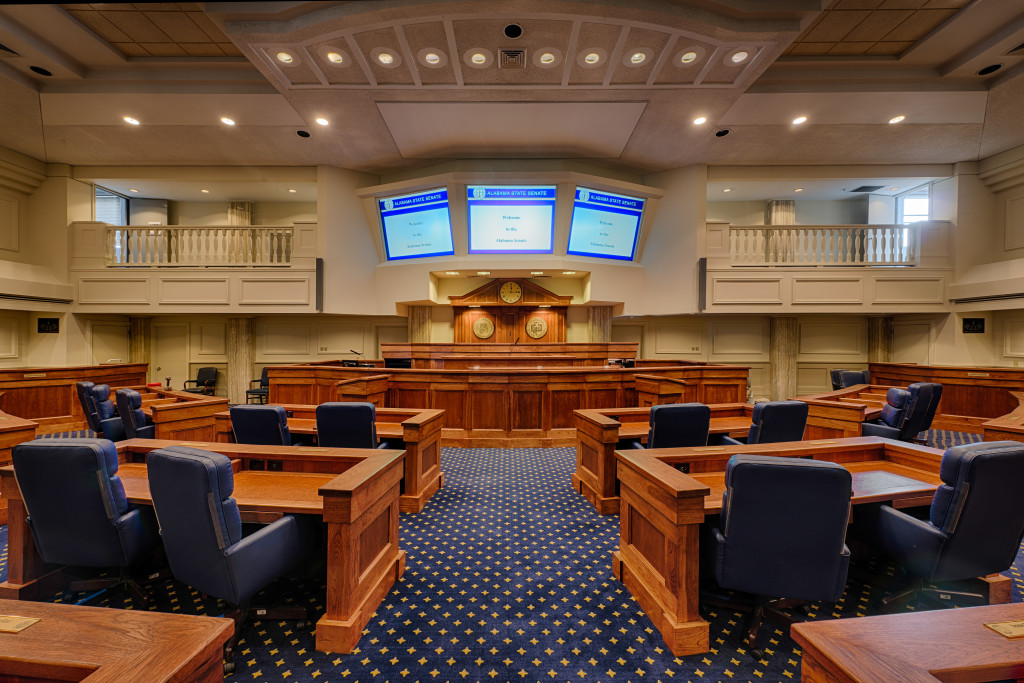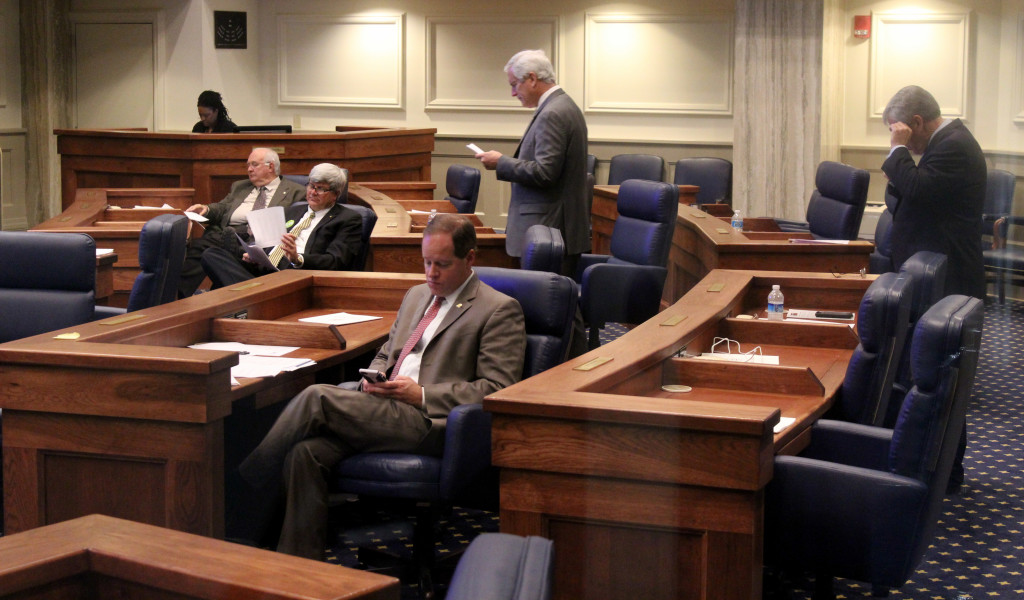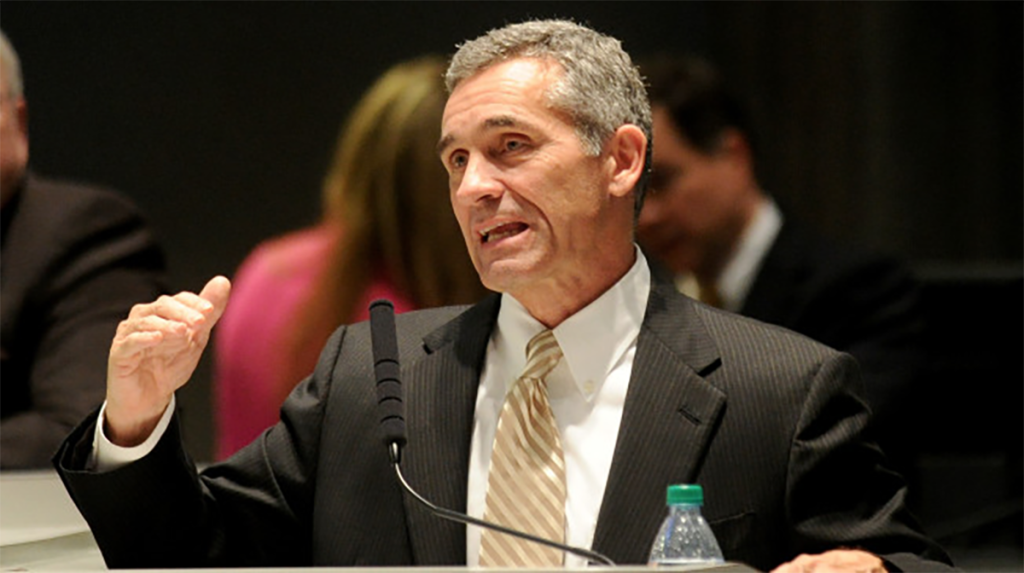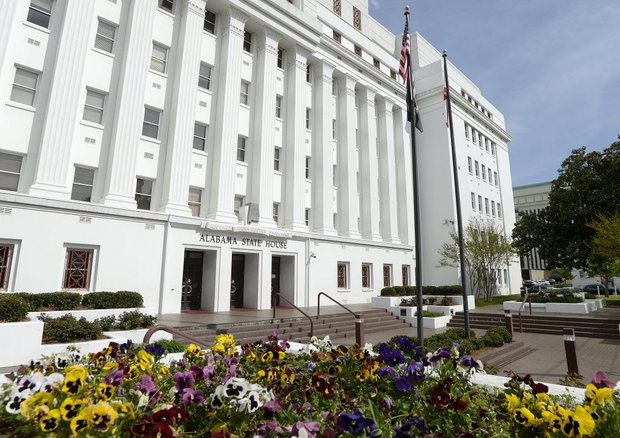Senate Rules panel quickly moves array of bills to Special Order Calendar

In a meeting that lasted less than 10 minutes, the Senate Rules Committee approved a number of bills for addition to the Special Order Calendar. Unlike other committees, the Rules Committee does not give favorable or unfavorable reports. It simply approves or disapproves of bills slated to be added to the daily calendar of bills headed for their respective bodies. With little discussion, the committee approved the entire slate of legislation that included 20 bills. Among those approved for a move before the full Senate was SB136 from Sen. Vivian Figures (D-Mobile), which would raise money for Medicaid via a 5-mill increase in the state’s low property tax. Figures noted in an earlier committee meeting that the move would net about $280 million by 2019 and every year thereafter. The committee also approved SB268 from Sen. Cam Ward (R-Alabaster), which would revoke the Medicaid benefits of city and county jail inmates while incarcerated. SB285 from Sen. Arthur Orr (R-Decatur) was also approved by the committee. Orr’s bill would put further restrictions on public assistance programs, such as Supplemental Nutrition Assistance Program (SNAP) and Temporary Assistance for Needy Families (TANF) benefits. The bill specifies that SNAP benefits should be terminated if a recipient is late on child support or any “court-ordered support payments.” The bill would also put a lifetime limit of 36 months on TANF benefits and require the Medicaid Agency to better track the income and assets of benefit recipients. Further, the bill would require out-of-state purchases with TANF money to be tracked and a person’s citizenship to be questioned if too many such purchases are made. The committee also approved the Unborn Infants Dignity of Life Act, HB45 from Rep. April Weaver (R-Alabaster), which provides for the “dignified final disposition of the bodily remains” of infants and prohibits the already-illegal sale of fetal tissue. Weaver’s bill has already cleared the House and its addition to the Senate calendar poises it to approach final passage.
Trespassing in Alabama could soon cost you up to $6,000, one year in prison

The Alabama Senate passed legislation Thursday which will increase penalties for “criminal trespass of critical infrastructure,” thereby better protecting Alabama businesses. “Critical infrastructure” references such establishments as chemical manufacturing facilities, electrical tower substations, railroad switching yards, trucking terminals and water treatment facilities. SB217 from Sen. Cam Ward (R-Alabaster) would increase penalties for such crimes to a Class A misdemeanor, which carries a fine of up to $6,000 and a possible sentence of one year in prison. Previously, crimes of this nature were considered only a criminal violation, punishable by up to 30 days in jail and a $200 fine. “These are extremely sensitive business sites that often contain dangerous chemicals or support our utility infrastructure,” Ward said in the release. “Criminal trespass of these sites puts the public at risk and represents a huge loss in annual revenue to Alabama’s businesses and consumers.” “We applaud Senator Ward’s leadership in championing this important piece of legislation protecting Alabama’s manufactures and their partners,” stated George Clark, President of Manufacture Alabama. “Ensuring the safety and security of our state’s vital industries allow them to build their businesses and grow Alabama’s economy.” With its passage in the Senate, the bill is cleared to go before a House committee before going to the full House of Representatives.
Senate passes slew of bills with nearly empty chamber

During Thursday’s legislative session, a variety of bills were passed on the Senate floor with at one point, only 13 lawmakers attending. The number of senators slowly dwindled throughout the session until a most were absent. Among the bills passed with a nearly empty chamber were SB95 from Sen. Dick Brewbaker (R-Montgomery), which allows foster children to visit friends without the permission of the foster agency; SB131 from Sen. Paul Sanford (R-Huntsville), which provides a tax break for the money people pay into their Health Savings Accounts; SB103 from Sen. Tom Whatley (R-Auburn), which would increase the cost of waterfowl stamps; and SB215 from Sen.Jimmy Holley (R-Elba), which allows for “automated civil enforcement” of school bus violations and at least five others. The only bill that faced real conversation was SB148 from Sen. Jim McClendon (R-Springville), which would require all passengers in a car to wear a seat belt. Currently, everyone under 15 years of age is required to buckle a safety belt in the back seat of a car. McClendon’s bill would require everyone to do so. Sen. Trip Pittman (R-Montrose) opposed the measure on the grounds that it is an overreach to require all car riders to fasten a safety belt, which McClendon asserts would save lives. Sen. Vivian Figures (D-Mobile), who noted her support for wearing seat belts, contested the requirement that drivers be charged with the folly of their passengers. The Senate carried McClendon’s bill over and adjourned shortly thereafter.
State Senate passes monuments bill despite Dem outrage

The first item on Senate’s agenda Wednesday was the hotly contested bill from Sen. Gerald Allen known as the Alabama Heritage Preservation Act, which prohibits the removal of historical monuments and lays out the process by which municipalities can petition for waivers to remove such monuments. The item came up for discussion during Tuesday’s session, but debate was cut off after Pro Tem Del Marsh (R-Anniston) acknowledged that nothing would be accomplished due to a Democratic filibuster on the item. Marsh motioned for adjournment and the body commenced with discussion again as the session got underway Thursday morning. As Allen was recapping Tuesday’s activities, a cloture motion was made to cease discussion of the issue at 10:10 a.m. Immediately, Democrats began railing against the legislation and the motion for cloture. “Yet again, we’re about to let ‘Big Brother’ go in and tell municipalities what they can do,” said Sen. Bobby Singleton (D-Greensboro). “Remember, you are a party of less government and I can’t believe a cloture motion has been made on something such as this.” Sen. Hank Sanders (D-Selma) chimed in as well, noting that allowing Confederate monuments on public property gives the impression that all people should subscribe to the ideals held by those being memorialized. “This is about the legacy of slavery in many ways,” Sanders said. “The monuments they’re trying to protect are generally of people who supported slavery in one way or another. You know, slavery has long arms – it reaching all the way from the 17th, 18th and 19th centuries into the present.” “There was a time in this country where African-Americans were really just kind of abused like these bills abuse people,” said Sen. Rodger Smitherman (D-Birmingham). “We’re opening ourselves up for some very embarrassing exposure to the nation. I don’t want our state to get that kind of black eye.” By the time the three Democrats had finished speaking, time had expired for discussion on the bill. The bill passed by a vote of 22-9 down party lines.
State Senate OKs minimum wage uniformity, blocks Birmingham increase

The Alabama State Legislature is pushing back against cities hoping to set their own minimum wage standards. Thursday, the Alabama Senate voted in favor of HB174 — also known as the Alabama Uniform Minimum Wage and Right to Work Act — a bill that would block cities from setting individual minimum wage rules. The Alabama House already approved the bill. The measure was approved by a 23-10 vote, mainly on party lines. “Senate Republicans deserve credit for championing and affirming that free enterprise creates opportunity for all,” said Sen. Jabo Waggoner (R-Vestavia Hills), a sponsor of the bill. “By passing the Alabama Uniform Minimum Wage and Right to Work Act, we are protecting job creators from having to deal with dozens of different minimum wages and labor rules that would vary from city to city.” The bill, which went directly to Gov. Robert Bentley for his signature, prevents local governments from instituting a minimum wage and requires all cities and counties in Alabama to use the federal wage standards as a measure. In addition, the legislation cements Alabama as a right-to-work state by giving the Legislature alone authority to establish uniform employment policies and regulations of collective bargaining. “We want businesses to expand and create more jobs – not cut entry-level jobs because a patchwork of local minimum wages causes operating costs to rise. Our actions today will create predictability and consistency for Alabama’s economy, which benefits everyone,” Waggoner said. The Senate’s action comes amid a battle between Birmingham and the Alabama Legislature over minimum wage standards. Birmingham City Council voted Tuesday to increase the city’s minimum wage to $10.10 an hour, effective the next day. In August, council originally had voted to begin the $10.10 minimum July 2017. Bentley signed the bill less than an hour after the vote, effectively blocking the Magic City’s efforts.
Cam Ward: Time to lend the poor a hand by shining a light on lawsuit lending

For decades, Alabama was known as “tort hell.” The legal environment was tilted toward plaintiffs and businesses were taking it hard on the chin. This made some trial lawyers very wealthy, but it cost Alabama untold thousands of jobs as businesses and doctors went elsewhere. During the 1990s, voters flipped the appellate and Supreme Court to Republican justices. In 2010, the people of Alabama elected a conservative, Republican majority to the Legislature. Common sense reforms since then have brought Alabama’s legal environment back to healthy balance. Now over the past few years, a new form of predatory lending – known as lawsuit-lending or litigation finance – has to come to the surface. Lawsuit-lending companies, often backed with hundreds of millions of dollars from Wall Street financial firms, speculate on the outcome of legal cases by placing bets on the final decision of a case in the form of loans to a plaintiff. These loans usually have excessively high interest rates, sometimes exceeding 150 percent, which often drain away payments awarded to a plaintiff. For example, Binyamin Applebaum of the New York Times has reported that in 1995, a woman in Philadelphia borrowed money to finance a lawsuit concerning a car accident. But Applebaum writes that by “the time she won $169,125 in 2003, [her] lenders were owed $221,000.” The aggressive lawsuit lending industry poses two challenges to Alabama’s legal system. First, the exorbitant interest rates on lawsuit loans distort how plaintiffs negotiate in the legal process. Inevitably, plaintiffs refuse reasonable offers of damages from the defendant and push for more and more money to cover the excessive loans they will owe, like the woman from Philadelphia. But the main problem now is that lawsuit lenders operate largely in the dark, outside the normal regulations governing other types of lenders. Lawsuit loans are not subject to overview from the state Banking Department and lenders can operate without a license in Alabama. It is time to bring lawsuit lending into the light of common-sense regulation. In February, I will introduce legislation in the Alabama Senate that will cap lawsuit loan rates at 10%, require lawsuit lenders to obtain a license, and give the state Banking Department oversight of the industry. Every other type of lending is regulated in Alabama; why should lawsuit-lending companies, often backed by hundreds of millions of dollars from hedge fund titans and Wall Street financiers, alone be exempt from state regulation? Conservatives have worked hard to achieve a legal system that is fair to businesses, individuals, and plaintiffs. But left unchecked, lawsuit-lending companies will continue to prey on unsuspecting consumers, drive up the cost of doing business in Alabama, and add more cases to an already overburdened legal system. Tennessee, Arkansas, and Oklahoma have all passed common-sense regulations of the industry over the past few years. It is time Alabama joined their ranks. • • • Republican state Sen. Cam Ward represents District 14, which includes all or parts of Shelby, Bibb, Chilton, Hale, and Jefferson Counties. He is chairman of the Senate Judiciary Committee. Follow him on Twitter: @SenCamWard
Lawmakers resume talks on budget, education transfer

Alabama lawmakers are resuming budget talks after a late-night meeting failed to get an agreement. A conference committee will meet Tuesday morning to resume negotiations on a proposal to shift education funds to the cash-strapped general fund budget. The Alabama Senate on Monday evening debated a proposal to take $100 million of $225 million in use tax funds that now go to the state’s education budget. This passed through the Senate 19-11. Senate President Pro Tem Del Marsh said many senators see that as a reform to get growth revenue into the perpetually cash-strapped general fund budget. A House and Senate joint conference committee about the use tax funds and rolling reserve, was postponed until 10:30 AM Tuesday. They worked a late evening, adjourning at 10:30 PM Monday. Senators could also vote on a House-passed bill that would put a 25-cent-per-pack tax on cigarettes tomorrow. Lawmakers are in a special session to address a $200 million general fund shortfall for the fiscal year that begins in 16 days. Republished with permission of the Associated Press.
Alabama senator Del Marsh gets free hotel for promise to renovate

Alabama Senate Pro Tem Del Marsh is a handy man to have around the Alabama State House. During the 2015 legislative session, the state’s top senator tore down walls known as filibusters, swept the floor of unwanted bills and drew a blue print for bringing gambling to Alabama. For his next project, in his home district and far away from the Statehouse, Marsh will remake a mansion. Marsh Properties, operated by Marsh, R-Anniston, has acquired downtown Anniston’s historic Victoria Inn from the Anniston City Council. The city council, which voted on Monday to transfer the property to Marsh Properties, is giving away the historic inn for free under the condition that the new owner spends at least $1.5 million on renovations. The city has sought someone to take over the Victoria Inn since soon after it acquired the property from Jacksonville State University Foundation in 2013. In an interview this week, Marsh said the city issued a request for proposals but didn’t receive a single response. The city then issued a second request, with Marsh Properties as the only contender. “It’s not something I would have typically taken on, but my wife and I are in position to take it on and we’re excited about it,” Marsh said. “We think it’s an important historical facility for the area and we want to maintain it.” Marsh said the company plans to rename Victoria Inn as Hotel Finial, named after the 19th Century finial atop the main house. According to the Victoria Inn’s website, John Mckleroy – a Confederate veteran, state school superintendent and two-time candidate for governor – built the structure in 1888 as his home on a hill. Nearly 100 years later, Anniston developer Earlon McWhorter and architect Julian Jenkins restored the home and in 1984 the National Park Service listed it on the National Register of Historic Places. Neither Anniston’s mayor nor the city’s manager responded to multiple requests for comment about the property transfer. Marsh said he plans to leave the outside of the Victoria largely same, while making a number of changes to the interior. Marsh Properties will renovate “every single room,” changing the decor of the 19th century structure to give it more of a contemporary feel that is “comfortable and suitable” for the present time. The renovated Victoria Inn will not have a full-scale restaurant, although it will maintain a bed and breakfast. The goal, Marsh said, is to have guests visit area restaurants. Marsh said he expects renovation costs to exceed $1.8 million, adding that he’s ready to spend “whatever it takes.” The goal is to be operational by February 2016, he said. “We think that the Victoria Inn is historic to Anniston,” Marsh said. “It’s the only hotel left in Anniston, and we just think that it’s important that it survive and be brought back to its potential.” Republished with permission of The Associated Press.
Nearly half of states expect to confront big budget gaps

With the nation’s economy at its healthiest since the Great Recession, a surprising trend is emerging among the states — large budget gaps. An Associated Press analysis of statehouse finances across the country shows that at least 22 states project shortfalls for the coming fiscal year. The deficits recall recession-era anxiety about plunging tax revenue and deep cuts to education, social services and other government-funded programs. The sheer number of states facing budget gaps prompted Standard & Poor’s Ratings Service to call the trend a sort of “early warning.” “After all, if a state is grappling with a budget deficit now, with the economic expansion approaching its sixth anniversary, what will be its condition when the next slowdown strikes?” credit analyst Gabriel Petek wrote in a recent report. The forces at work today are somewhat different than when the recession took hold in 2008. In some states, revenue growth has been stagnant, missing projections and making it difficult to keep pace with expanding populations and rising costs for health care and education. Other states have been hurt by a steep decline in oil prices or have seen their efforts to promote growth through tax cuts fail to work as anticipated. The result is a nation divided between states such as California and Colorado that are riding the wave of the economic recovery and others such as Illinois and Pennsylvania that appear closer to bust than boom. A majority of states have failed to climb back to their pre-recession status, in terms of tax revenue, financial reserves and employment rates, said Barb Rosewicz, who tracks the fiscal health of states for The Pew Charitable Trusts. Alabama, for example, faces a $290 million shortfall after a voter-approved bailout expires at the end of the current fiscal year. Projected cuts would create a $27 million hole in the state’s court system, forcing more than 600 layoffs and leaving just one juvenile probation officer and two clerical staffers in each county, said Rich Hobson, administrative director for the Alabama Unified Judicial System. If nothing is done, the courts will not have the staff to send jury notices, monitor juvenile delinquents, process protection orders and collect and distribute child support payments, he said. “This is an insane proposition,” Hobson said. “The public would suffer.” To avoid the cuts, Republican Gov. Robert Bentley has proposed raising $541 million through increases in the tobacco tax and sales taxes on automobiles. A top Republican in the Alabama Senate has introduced a gambling bill that would ultimately ask voters to decide whether to create a state lottery and allow four casinos. Lawmakers in some other states, including Nevada, Connecticut and Pennsylvania, have also debated whether to raise taxes. Nationally, total tax revenue coming to the states has been rising, but the pace has been slow as employment continues to lag pre-recession levels in more than half the states, according to the Pew Charitable Trusts. Pew also found that 30 states are collecting less revenue than at their peak. “What we are seeing across states right now is an economic and financial recovery that is a little bit different than the recoveries we’ve seen in the past,” said Emily Raimes, a vice president with Moody’s Investors Service who tracks state government finances. Previous recoveries were broader, she said, benefiting more states and allowing them to replenish their financial reserves. The Census Bureau recently reported that total state government tax collections in fiscal year 2014, which in most states ended last June, increased 2.2 percent over the previous fiscal year. That represented the fourth consecutive overall increase, but 17 states reported declines in tax revenue from the previous fiscal year, according to the report. Alaska saw the biggest drop, of $1.7 billion. Alaska relies heavily on oil revenue and projects a $3.2 billion budget shortfall for the coming fiscal year. A special legislative session has been called after lawmakers failed to agree on a way to fund the budget, even though the state has plenty of money in reserves to cover the gap. That’s not the case in Illinois, where lawmakers are trying to figure out how to close a $6 billion projected shortfall for the next fiscal year, largely because of the expiration of a temporary tax increase. Republican Gov. Bruce Rauner, who campaigned against the tax plan, has suggested cuts to health care, local governments and other areas. But lawmakers in the Democratic-led General Assembly say spending cuts alone will not close the gap. In Kansas, the Republican governor and GOP-dominated Legislature now confront budget deficits after aggressive tax cutting that prompted them to reduce school funding this spring. Districts across the state have cut staff and programs such as summer school, and at least eight are ending the current school year early to save money. That includes the Shawnee Heights district outside Topeka, where students will begin their summer break two days early. Lawmakers passed a new school funding law that promises the money will be restored and state aid will rise each of the next two fiscal years, but educators are skeptical. “There’s no rational person in education who would think we’ll be getting that money, when the state budget is tanking,” said Charles Walther, a middle school history, government and geography teacher who heads the district union. Republished with permission of The Associated Press.
Senate Democrats call for Medicaid expansion

Democrats in the Alabama Senate are urging Gov. Robert Bentley to expand Medicaid under the Affordable Care Act. The Alabama Senate on Tuesday approved a resolution saying that Democrats and the one independent member of the Alabama Senate support Medicaid expansion. Senators said Medicaid expansion would provide health care coverage to 300,000 Alabamians. Senators approved the resolution on an 8-2 vote. While Republicans hold a majority in the Alabama Senate, most Republicans didn’t vote on the resolution. The resolution soothed a partisan fight that threatened to derail legislative business for several days. Republicans approved a resolution last week saying that it was the intent of the Alabama Legislature to not expand Medicaid. Democrats argued that was incorrect since Democrats in the Legislature favor expansion. Republished with permission from The Associated Press.


